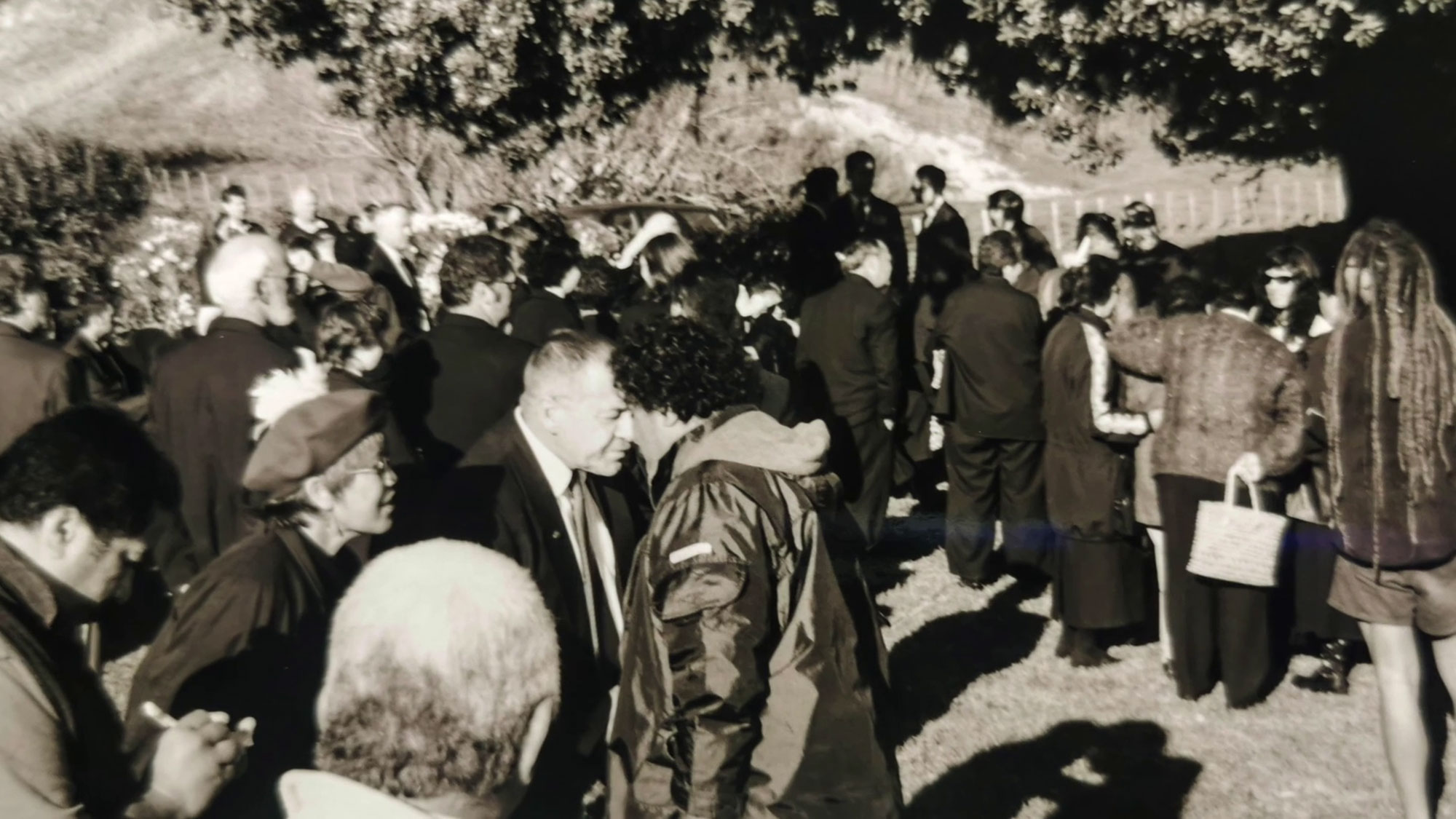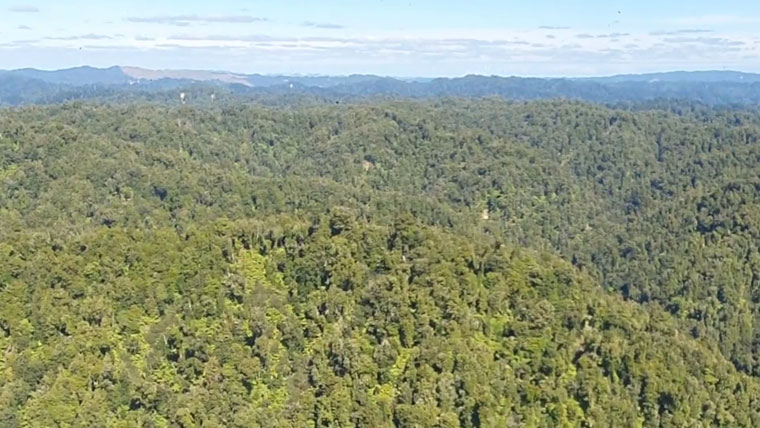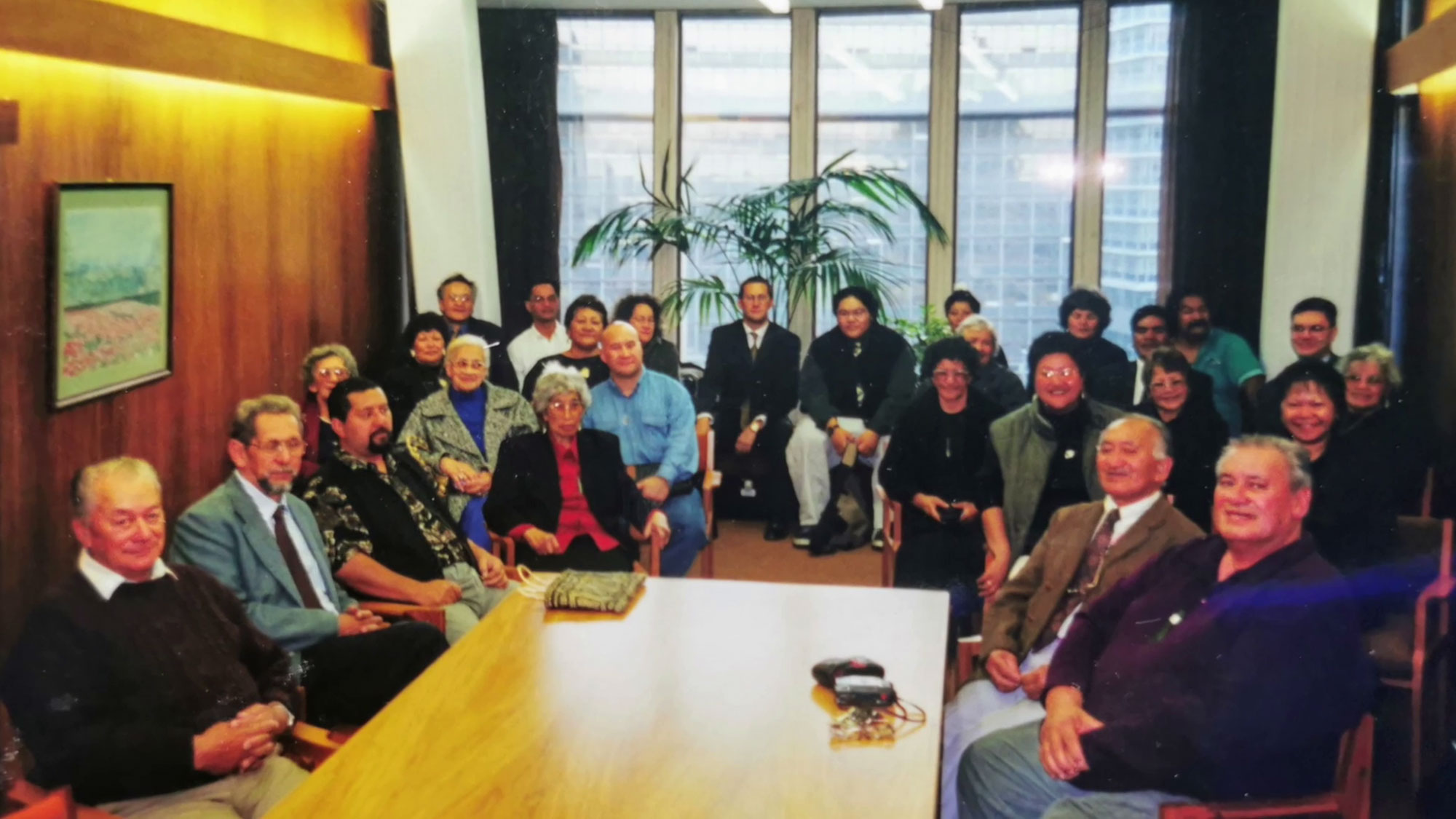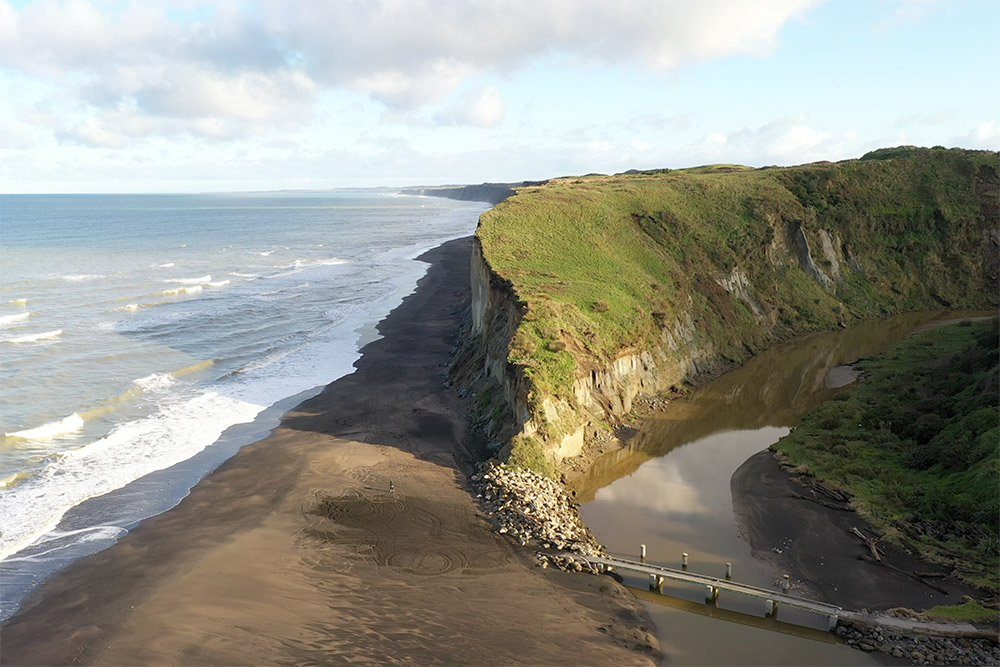Ngaa Rauru Kiitahi: Inside the lion's den
Chapter 4
Inside the belly of Tuutaeporoporo
“The settlement would not achieve justice but it would acquire a means to a prosperous and sustainable future.” - Mike Neho, Iwi Negotiator
Explore Chapter 4
Video transcript
Te Huia Bill Hamilton, Former Iwi Negotiator:
‘What I wanted to happen was for it to tell our stories, to honour our tipuna, and to have a development factor in there.’
Te Pahunga Marty Davis, Former Iwi Negotiator:
‘Honouring our tuupuna was a biggie for us, for all of the stuff that they had to bear. And providing for our tamariki, mokopuna.’
Mike Neho, Former Lead Negotiator:
‘We said this settlement would not achieve justice but it would acquire a means to a sustainable future.’
Te Huia Bill Hamilton, Former Iwi Negotiator:
‘Traditionally the Crown made an offer but we told them, the Crown, that we didn't want them to make an offer, that we would table the first quantum, and they agreed to us doing that.
One of the unofficial policies that the Crown had and I’m not sure that I can still get the numbers right but we calculated on current values of land and all of that based on what we'd lost, that our settlement was probably in the realm of 3.7 billion dollars and I think we calculated that based on the settlements that had gone before us that they were paying $5 a hectare or an acre for, um what do they call it, illegally possessed land, illegal purchases, and about $25 for raupatu a hectare on that.
And so if that was being calculated on us, we figured, and so did the experts in Wellington figure, that we’d be getting about 19 million but we calculated that we were due 3.7 billion based on what was taken on current land value. And so we built up a paper around that and tabled it.
We formally tabled a quantum and we put it at $100 million, which I thought was quite ridiculous because there was no way they were going to give it to us.
I thought we could get close to 50. We put that in and then they came back with 18 or something like that.
At that stage there had been those two big settlements with Ngaai Tahu and Waikato that had $170 million but all the other ones, even for areas bigger than ours, I don't think any of them exceeded $42 million and so for us and I think the benchmark that I had in mind, was we’d try and get as much as Ruanui had got for theirs.’
ONE News story, TVNZ, 2003
Molyneux, Tini (reporter), 2003, One News:
‘An historic apology and tens of millions of dollars is now in the hands of South Taranaki Maaori.
Ngaati Ruanui became just the second tribe to hear the Crown say sorry for the confiscation of 90,000 hectares of land. More than 200 people were there to hear it. Maaori Affairs Correspondent, Tini Molyneaux, was with them. (Judy Bailey, news presenter, One News)
The final steps to a milestone moment for this Taranaki tribe. A Deed of Settlement, along with an apology from the Crown.
'The Crown profoundly regrets and unreservedly apologises to Ngaati Ruanui.' - Hon. Margaret Wilson, Minister in Charge of Treaty of Waitangi Negotiations
This is just the second time the Crown has apologised publicly for its past treatment of Maaori.
“The apology will have to be accepted. And now Ngaati Ruanui are focussing on the future.” - Rocky Hudson, kaumaatua of Ngaa Ruahine and Ngaati Ruanui
Ngaati Ruanui’s claim arises from a long fought battle with the Crown in the mid 1880’s. It resisted selling land in a stance seen to be rebellious. And a year later Crown troops confiscated more than 80,000 hectares in a series of scorched earth policies, which destroyed villages, crops and lives.
The cumulative effect of the Crown’s actions in purchasing land in Taranaki created tensions that led to the outbreak of war. Ngaati Ruanui was also at Parihaka during its years of passive resistance.”
The Crown acknowledges the serious damage it inflicted on the prosperous Maaori village of Parihaka and its insult on the human rights of the people'. - Hon. Margaret Wilson, Minister in Charge of Treaty of Waitangi Negotiations
Along with the apology comes $41million dollars, a combination of cash and Crown-owned land.’
Te Huia Bill Hamilton, Former Iwi Negotiator, 2003, One News:
‘And that was a bit of a struggle to get there because when they reached $28million, they said it was full and final.’
full: adjective
1. complete.
final: adjective
1. allowing no further doubt or dispute.
Generally, ‘full and final’ is a term commonly used in settlement agreements to signify the resolution of all issues involved in a dispute and the parties shall have no other claims against each other.
Te Huia Bill Hamilton, Former Iwi Negotiator:
‘I think their first amount they tabled was 25, and so we got another $6million out of them. And when they tabled it at $28million as full and final, we had to use a bit of sorcery.’
sorcery: noun
1. the use of magic
Te Huia Bill Hamilton, Former Iwi Negotiator:
‘When we entered into the negotiations we agreed that our aims were to revitalise. First of all; tell the stories of our tuupuna. So to honour them and to tell their stories. And then to honour our mokopuna and revitalise Ngaa Rauru Kiitahitanga.
And when they put the letter of offer to us they only put one of those things down, and so we didn't say anything to the negotiators, to the office, but we met with the Minister, and we said, “Well Minister, well we've received this but it's only half the offer. Because we've agreed that we will work to honour the Crown,” which is what they wanted out of it, “and we’ve agreed that we would honour our tupuna by telling their stories, but we also agreed that we would revitalise Ngaa Rauru Kiitahitanga, and there is nothing in there for that.”
The director of the Office of Treaty Settlements was embarrassed. And he was speechless. I can remember him standing up and saying, “But Minister, but Minister, but Minister!”.
And that’s all he could say. We were just sitting there smuggly smiling and we said, “Well, Minister, we can’t find where it says we”re revitalising Ngaa Rauru Kiitahitanga so I presume we haven't sorted that bit out and so we can sit down and see what that bit is worth”.
He was most indignant about it and ‘cause he knew that it was his fault. And it was purely a clerical omission but $3million dollars out of a clerical omission, that's pretty good.
There weren’t really strong policy settings for the government on how to do the negotiations as well, so there was an opportunity to create new things.
The other expectation that I had is that we would bring our people with us. That we wouldn’t have a negotiation that our people didn’t know about. When we started negotiations we were left with the impression that what was said in the room stayed in the room, and people couldn’t participate. But we did a couple of things that were really really worthwhile that kept up with that kaupapa of our whaanau being involved.
The first thing is that we made sure that the government team of negotiators spent time back home so that they got to know the rohe that they were talking about. They had waananga, a couple of waananga. They had one back here, they had one in Hongoeka marae and it was learning about Ngaa Rauru Kiitahitanga, learning about our people. And so we weren’t just things they negotiated with. We were whaanau, hapuu, iwi.
There was quite strict rules around being in the A Team and a B Team, and we insisted that one negotiation would happen in Wellington and the next one would happen back here and we have it on a marae and no matter what L.A.W you have, there’s a tikanga that says the marae belongs to everybody so people just came if they wanted to come, they came and they were part of whatever we talked about. And that had a couple of effects.
In the end, we had quite a trusting relationship between the crown negotiators and ourselves, and we got on pretty well, as best you can under the conditions. We had some of the junior crown officials, for example, getting quite emotional when the Crown did heavy stuff against us. And on a couple of occasions, cried when their bosses put hard things down for us and they knew what was being put down was government policy but it wasn’t fair so that was one thing.’
John Clarke, Ngaati Porou, Former Crown Translator:
‘There is still a long way to go ahead of you. So, you are the reason we are standing here today. We acknowledge you.’
Te Huia Bill Hamilton, Former Iwi Negotiator:
‘The other thing we insisted on was they have a reo speaker on their team, so that whenever any of our negotiators wanted to koorero i te reo then basically it was over to them to find the translation.
And they had a senior justice department official, John Clarke, who was there from Ngaati Porou, and he was really really good to work with. He maintained the mana of us, as well as them in the koorero and because he said it, you didn't have to go through the barriers of, ‘Is this pono?’, and because he said it, it was pono. We’d hear his interpretations and we’d be happy about how he’d expressed them.
So that was breaking the mould a bit. So public participation and requiring them to have a reo person on their side was a tactical thing that we did to make sure that we brought our people with us.’
But no matter how genuine the intent, the outcome would always be dictated by process and policy.
Te Huia Bill Hamilton, Former Iwi Negotiator:
‘We were in the negotiating room and we wanted a break because they had just put an offer on how much land they would give us back at Waitotara, Waikaramihi, and they offered us 10 hectares back.
They talked about three points that would identify it as sacred sites, which they’d agreed to and they triangulated and it came to about 10 hectares and we were miffed about it because I think there was about 800 hectares for that whole area there. And I think we put a claim in for half of it or something like. We said we wanted 400 of it back and anyway we broke and they went into a room, and we stayed in the main negotiating room but they went into a separate room.
I decided I wanted to go to the toilet at that time and just as I was entering the entrance to their room, I heard one of them say, 'So why are we only giving back 10 hectares?'. And one guy said, 'Well, we can get away with it. That's all we have to do'. And I stopped at the door before they saw me and I thought, my god is that how they do it? Anyway, I just looked and I walked past the door, looked in, and I said, 'Really?'
And then I went back to our room and I told the rest of the team that and so we brought them back in. We had an interesting 10 minutes after that. And we broke off negotiations and then when we came back the first thing that was in, is that that increased from 10 to 100 hectares without any say.
One of the things that was brought home to me, is how they made policy on the hoof. And you had very very junior people in government, you know they may have been senior in their department but in the nature of things, they were junior officials making those decisions about us. Even though we got a hundred hectares back out of 800, I think we were still screwed over.
But it was better than the 10 they originally tried to offer us and if we hadn't caught them out in that duplicity, we probably would’ve had to have settled for 10.
One of the things that we established as a principle was we’d always come home and tell the people about the negotiations- what happened, what we’d got, and all the rest of it.
There were individuals in the iwi who would say, ‘Nope. Forget about it! Drop it! Forget about it.” And then there were others who would say, “Nope. Carry on’. And then there was the bulk of them who you just knew inside of them that they were swaying one way or the other and then they were looking to whoever had dominance as a leader in those times to go forward or not go forward. So those were pretty tense times.
I think one of the other, one of the big difficulties we had was that every word that we got in, that was about Ngaa Rauru Kiitahi, or tikanga, or reo, or something like that- we actually had to negotiate it. We had to put it on the table. Explain it. Convince them. Leave it with them. Then come back another time. And they’d accept it or not. And as we got closer to putting the Agreement In Principle together, which is probably the first template to the Deed of Settlement, and then to the legislation, but once it gets into the Agreement In Principle, it's pretty hard to change. And then all of a sudden you’d see these clauses that would slip in and we’d say, ‘How did that get in?’
This goes into every every negotiation and it was just you know every word we had had to be negotiated in there and yet there was some standard clause that they'd just put in there, in the agreement and so that's really just an unfair and unbalanced approach to the whole negotiation process and those issues came up.’
Te Pahunga Marty Davis, Former Iwi Negotiator:
‘The biggest thing that frustrated me was, we were stuck under, our population was guaranteed under the census of the time when we started, i think we were in the 99 census, which we didn't realise when we began the process that it was going to be pegged back to a census time, otherwise we would’ve gone around and said “get in that jolly census.” So our numbers were really low. So they put a dollar sign on the head of your population and that’s you, and they won’t go outside it.
So that was really frustrating to be told that halfway through the process, our numbers, so we could’ve doubled our numbers and I think doubled our quantum by just that one thing.
Conservation, they did a good job on us I felt, at the end of the day.
We felt as if conservation at that time was really powerful and we couldn’t make any headway there, anything. Even the establishment of uukaipoo, areas where we could go camping in our own takiwaa and that, you know, 'ohh yes you can do that but not in these parts, not in these times,' you know, and so it was very very frustrating working with conservation to try and get things across the line. For me, that was the biggest thing, and of course the quantum size.
We put up the best arguments in the world I would say to you. For instance they wanted us to say, 'Well what is the number?' and we said, well the starting point is actually the same as Ngaati Ruanui, ‘cause there’s no difference in what occurred there and what occurred here.’
Carolyn Miri Young, Former Administrator, Negotiations Team:
‘Always though, you had to be holding out front, why you were doing it, why we were doing it. Because if you lost sight of that, then, you know, you may as well pack your bags up and go home. Not knowing whether or not we were going to make the next milestone, ‘cause they were all about milestones.
You know, we didn’t have any say in how it went. There was a process and you have to stick to it. If we wanted to get anywhere, that’s what we had to do. We didn’t like it all the time, you know, it felt like it wasn’t the right thing to do. It felt like we weren’t getting anywhere doing it, but if we wanted to get to where we were going, um, you know, we had to do that.’
The watershed initiative that sets this settlement apart from any other, was the introduction of the accord, Paepae Rangatira.
Te Huia Bill Hamilton, Former Iwi Negotiator:
‘Margaret Wilson fancied herself as quite a treaty expert and when we put up the Paepae Rangatira, which is about putting into legislation the treaty relationship. I think she enjoyed that because it was new and innovative and it was a practical way of having her treaty thinking applied. And so I think that was one of the advantages.
It was after we got it into place that the Labour government of course realised that that would be too resource-intensive if they because the Paepae Rangatira required the Crown to meet with us every year, you know at Rangatira to Minister level to review the health of the relationship which meant work on their part, work on our part, and then time to negotiate it, and so we put that in, and I don't think we would have got it through with another government.
That template for the Paepae Rangatira is what the Government, current Government uses for its Maaori Crown relations.
Paepae Rangatira is the Crown sitting down with Ngaa Rauru Kiitahi leadership and negotiating a pathway forward, to properly look at the health of the Crown and Ngaa Rauru Kiitahi. That is Paepae Rangatira. Paepae Whakapakari is the section that applies to operations.’
Mike Neho, Former Lead Negotiator:
‘An initiative was created within Paepae Rangatira, its name, Te Mata o te Here. It follows on from the idea of a kind of enduring peace agreement.
There are five principal objectives of that programme, Te Mata o te Here, the key priorities being; Ko Te Kawa-a Maaui, which is the Indigenous Innovation Business Hub, and secondly, Te Kura I Huna. The Government is supportive of both of these programmes.
But it doesn’t end there. Outside of those major programmes the Crown continues to be supportive of other programmes that strengthen our people. Therefore, the benefits that derive from Te Mata o te Here are great.’
Te Huia Bill Hamilton, Former Iwi Negotiator:
‘I was proud to be a negotiator and I was proud that we got the best settlement I think that we possibly could’ve done. I did some calculations on lands and number of people and all the rest of it, and I think it worked out. We got the second best deal for land per dollar, and the second best deal for people per dollar and so we did pretty well.’
Te Pahunga Marty Davis, Former Iwi Negotiator:
‘The bigger goal and the driver for the likes of ourselves and Bill and all of that, was actually honouring our tuupuna. Getting the story straight in the schools, writing the history properly, so our kids didn’t grow up with a different history, and for us, for the likes of me, that was the key driver.
Our tuupuna sitting up on those walls and being spoken about as natives and so on and so forth and that, which wasn’t correct. And so we were hell bent on, the driver was to get that right and then you would get the education, the history of that right.’
Mike Neho, Former Lead Negotiator:
‘Money was the last consideration. Our first thought was to pursue a settlement that would strengthen us in our education, our conventions, values, protocols, environment, health portfolios, yes, all of those things.
We said this settlement would not achieve justice but it would acquire a means to a sustainable future.’
Traditionally, the Crown made an offer but the Iwi negotiators told the Crown they would table the first quantum. The Crown agreed to let them do that.

We calculated on current values of land and all of that based on what we'd lost, that our settlement was probably in the realm of 3.7 billion dollars, and I think we calculated that based on the settlements that had gone before us. They were paying $5 a hectare or an acre for illegally possessed land, illegal purchases, and about $25 for raupatu a hectare on that.
We figured, and so did the experts in Wellington figure, that we’d be getting about 19 million but we calculated that we were due 3.7 billion based on what was taken on current land value.
We formally tabled a quantum and we put it at $100 million. I thought we could get close to 50 miriona. We put that in and then they came back with 18 million, or something like that.
- Te Huia Bill Hamilton, Iwi Negotiator
At that stage, there had been two big settlements with Ngaai Tahu and Waikato, which were $170million respectively, but all the other settlements, even for areas bigger than that of Ngaa Rauru Kiitahi, none of them exceeded $42 million.
The benchmark was to get as much as Ngaati Ruanui had got for their settlement.

We felt as if conservation at that time was really powerful and we couldn’t make any headway there.
Even the establishment of uukaipoo, areas where we could go camping in our own area. ‘Oh yes, you can do that but not in these parts, not in these times’, so it was very frustrating working with Conservation to try and get things across the line.
For me, that was the biggest thing, and of course, the quantum size.
We put up the best arguments in the world. For instance, they wanted us to say, “What is the number?’, and we said, ‘Well the starting point is actually the same as Ngaati Ruanui because there’s no difference in what occurred there, and what occurred here.’
- Te Pahunga Marty Davis, Lead Iwi Negotiator
Government policy settings were not strong in the beginning but the Iwi negotiators perceived this as an advantage that allowed for innovation, an opportunity to create new ways of doing things.
This led to the watershed initiative that set this settlement apart from any other, Paepae Rangatira.
This accord meant the Crown and Ngaa Rauru Kiitahi would commit to meeting annually to assess the health of their treaty partnership.
Margaret Wilson fancied herself as quite a treaty expert and when we put up the Paepae Rangatira, which is about putting into legislation the treaty relationship, I think she enjoyed that because it was new and innovative and it was a practical way of having her treaty thinking applied. And so I think that was one of the advantages.
It was after we got it into place that the Labour government of course realised that that would be too resource-intensive because the Paepae Rangatira required the Crown to meet with us every year, Rangatira to Minister level, to review the health of the relationship which meant work on their part, work on our part, and then time to negotiate it. And so we put that in, and I don't think we would have got it through with another government.
That template for the Paepae Rangatira is what the current government, uses for its Maaori Crown Relations.
- Te Huia Bill Hamilton, Iwi Negotiator


